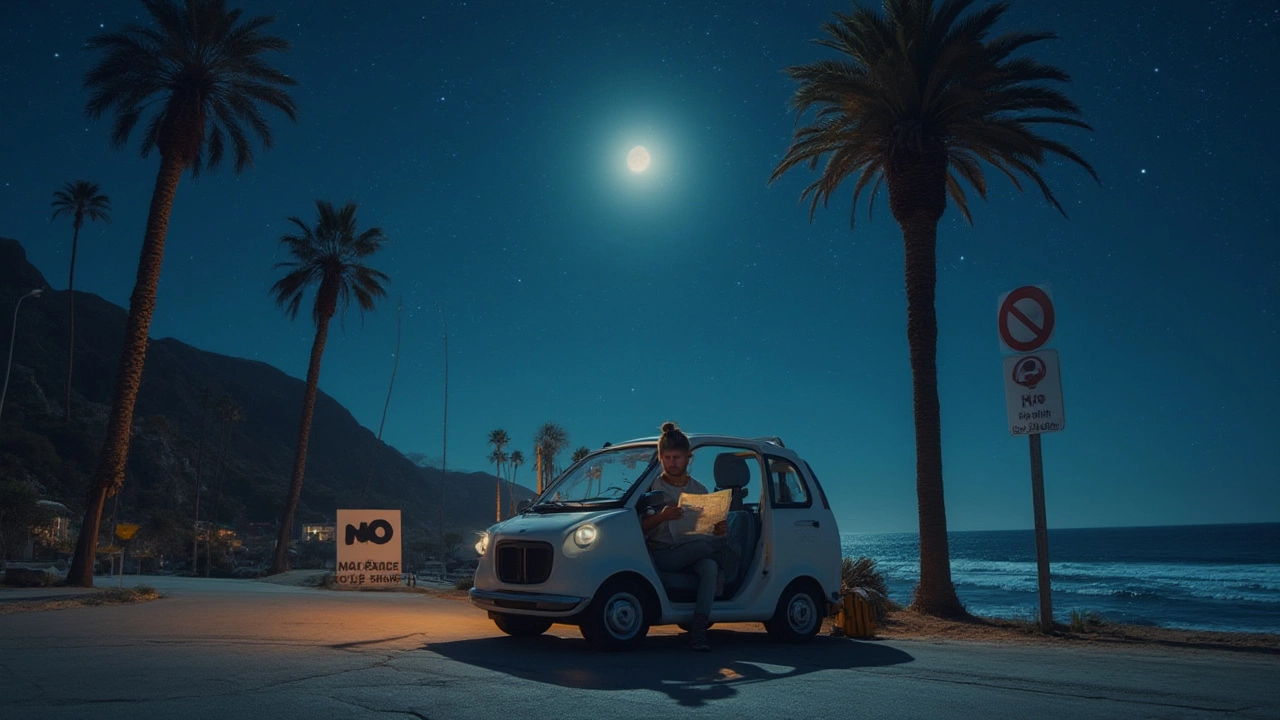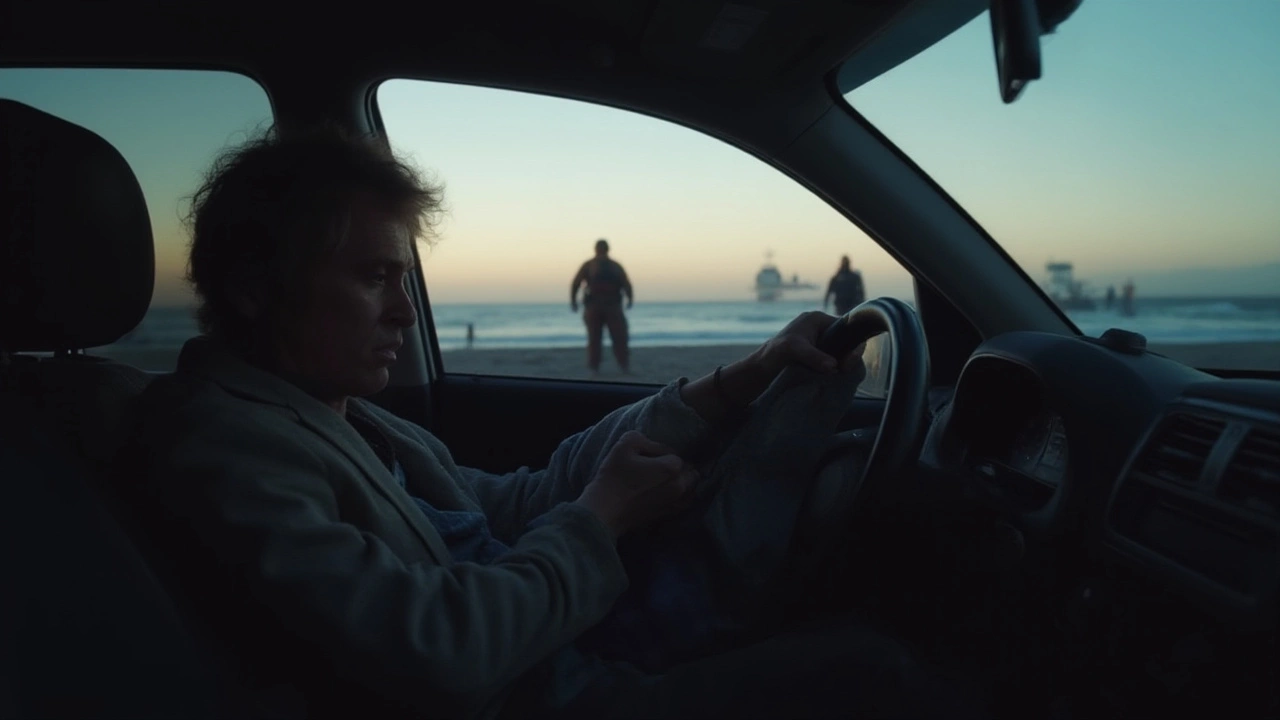Can You Sleep in Your Car at California Beaches? Rules, Risks & Tips
 Jul, 27 2025
Jul, 27 2025
The idea of crashing in your car at a California beach sounds like the ultimate taste of freedom. Sunsets over the Pacific, the sound of waves as your lullaby, and that unbeatable salt-air breeze sneaking in through your open windows—not a bad deal for the price of gas and a parking spot. But don't be fooled; just because the beaches are wide open doesn't mean the laws are too.
Can You Legally Sleep in Your Car at the Beach in California?
Here’s the truth: the Golden State does not offer a one-size-fits-all answer. The law changes from town to town, and sometimes even block by block. In cities like Santa Monica, Malibu, or Huntington Beach, local ordinances usually make it illegal to sleep in parked vehicles overnight—most toughen up enforcement between midnight and 6 a.m. Most State Park beaches ban overnight parking completely, but permit camping in designated areas for a fee. On the other hand, some small towns near less-popular stretches of sand might be more lax. But even then, it’s a gamble, as unpredictability is a running theme with California’s local regulations.
Many counties and cities have joined the movement to restrict overnight vehicle stays, especially after news coverage and growing municipal pressure about “van life” and urban camping. Large signs warning “No Overnight Parking,” license plate enforcement cameras, and bored security guards in SUVs are now part of the beachscape in places that once tolerated a car with fogged-up windows. Fines vary but can range from $35 up to $300 if you’re caught snoozing where you shouldn’t.
More frustrating still, state law doesn’t override local rules. The California Vehicle Code doesn’t say a thing about sleeping in a vehicle, but it does let cities create their own rules. In Los Angeles, for example, a municipal code bans living in vehicles between 9 p.m. and 6 a.m. close to homes, schools, or parks. A 2014 state law does require cities to allow overnight stays in organized “safe parking” lots for people experiencing homelessness, but these don’t apply to travelers hoping for a casual beach sleepover.
A quick search for “car sleeping legal” on any local city website will pull up the fine print and sometimes a handy map of forbidden streets. Some cities even have apps or hotlines for this kind of info. So, you might be yearning to “wake up to the waves,” but if you just wing it, chances are you’ll be woken up by a flashlight in your face and a knock on your window instead.
Why Is Sleeping in a Car at the Beach Restricted?
Ever wonder why sleeping in your car by the coast isn’t just silently tolerated? It’s not about ruining anyone’s fun—though it definitely feels that way at 2 a.m. after a cop raps your window. Here’s why these rules got so strict.
Local councils and beach communities started getting wary as more people moved into vans, RVs, and cars—some for fun, some by necessity—to save money on sky-high California rent. The state’s housing crunch led to “van life” going mainstream, which in turn led to more overnight vehicle dwellers. Suddenly, streets by the sand got crowded with parked cars, some staying for days or weeks, with out-of-state plates and blackout shades.
City governments started hearing complaints: blocked views, extra trash, and bathroom lines growing way too long. Residents also worried about safety—or, sometimes, just didn’t like things looking different from the postcard-perfect scene they expected. So cities wrote up new rules, sometimes giving law enforcement more power to move people along. Think of it more like a tug-of-war: warm California nights make it tempting, but local communities want public spaces—and parking—for everyone, not just travelers sleeping on a shoestring.
There’s also the safety angle. Cities worry about drug use, parties getting out of hand, and folks just being in a spot not meant for overnight living. Fire departments aren’t thrilled about propane stoves in parking lots. Litter was part of the mix, too. Some coastal towns even reported a jump in thefts linked to transient populations, though that gets complicated fast—correlation isn’t always causation.
On the environmental side, hundreds of cars parked overnight put more pressure on fragile beach habitats, whether it’s from spilled snacks, leaky fluids, or people using the dunes as bathrooms. Parks and beaches want to keep those dollops of wildness clean for the next sunrise.
The trickiest part? Rules can change quickly, so what might be fine one summer could be banned the next. Even street parking maps get outdated—local governments often tweak parking restrictions based on complaints or budget cuts. So, don’t just assume last year’s stealth parking spot is still a free pass today. Double-check before you drive out for that sunset nap.

Where Are You Allowed to Sleep in Your Car Near the Beach?
All hope isn’t lost if you still want the beachside nap. There are ways to do this legally, though they almost always involve a little extra planning and sometimes a few bucks.
Official campgrounds in California State Parks usually offer the best and simplest overnight beach access. These sites aren’t secret—they book up way ahead in places like Carpinteria, El Capitan, or Leo Carrillo. You’ll trade stealth for an actual camp spot, bathroom access, and no knock on your window. Some city and county beaches have their own campgrounds (like Doheny State Beach or Bolsa Chica), but don’t expect last-minute luck in summer. Even in winter, weekends can sell out. Reserve online where you can.
Some coastal parking lots are open 24 hours for overnight stays—but read the fine print! "24 hour" doesn’t always mean "overnight." In most cases, after 10 p.m. the lot’s either closed, enforced, or patrolled. A few beaches in Northern California, far from the big crowds, allow overnight vehicle stays for a night or two; these are rare and change regularly, so call ahead to check the local rules. Smaller county-run beaches may have more wiggle room, but don’t bet on it—again, call, check websites, or scan for posted signs (and read carefully).
Private lots near the beach (like some surf shops or marinas) sometimes offer "pay to park overnight" deals, but these are vanishing as the rules tighten. If you do find one, expect it to cost as much as a cheap hotel. Always get confirmation in writing—even a text or email—since a friendly cashier’s word won’t help if security shows up late at night.
Some “safe parking” programs across Southern and Northern California offer supervised overnight car camping for people without housing. These require registration and are not open to tourists, so don’t expect a drop-in beachside spot.
Your best bet? If you want to stay by the sand, book an official campground. If you’re in a pinch, public parking lots in major cities almost always ban overnight stays. Truck stops or 24-hour big box stores (like Walmart) might work inland, but almost never by the beach. And always read the posted signs—local police love to start their night shift clearing out would-be sleepers. Don't risk the fines, especially on a trip meant to be relaxing.
Smart Tips for Car Sleeping at California Beaches Without Trouble
If you’re still set on making it happen, here’s how to stay out of trouble, stay comfortable, and maybe even catch some real beach rest. Legal headaches aside, a little prep goes a long way in keeping your trip smooth and your wallet fine-free.
- Scout Before Sundown: Don’t arrive late and just hope for the best. Check the area in daylight, look for signs with rules, and scope out potential overnight options ahead of time.
- Be Stealthy, Not Sketchy: If you have to park on a city street, pick spots that are busy but not too busy—commercial areas away from homes or hotels. No loud music, no flashy van setups, and no hanging out by your doors all night.
- Stay Clean and Low-Impact: Bring your own trash bags, avoid leaving food smells, and skip cooking by your car unless it’s a legal campground. Coastal patrols are on high alert for any hint of overnight "camping" behavior.
- Keep It Short: One night might slide under the radar (if you’re careful), but more than that ups your chances of being noticed.
- Blend In: Popular van life rigs attract more attention than basic sedans. Use sunshades, wear normal street clothes outside, and don’t loiter by your car.
- Avoid Obvious Hangouts: Beach parking lots are the first places law enforcement checks at night. If you must park nearby, think about an industrial or commercial area a few blocks inland.
- Have a Backup Plan: If you get a knock and are told to move, don’t argue—move on quickly. Plan a second-choice place to go (like a 24-hour gas station or a legal campground inland).
- Take Security Seriously: Coastal towns aren’t immune to theft. Lock your doors, keep valuables out of sight, and don’t flaunt cash or gear.
- Book a Real Campground When Possible: For peace of mind, a paid campground or RV site guarantees you’ll get real rest and avoid fines.
- Apps and Maps: Use up-to-date navigation apps that list legal camping and parking spots. Check recent reviews—other travelers tend to warn about recent crackdowns or ticket blitzes.
The dream of sleeping in your car right at the beach lives on, but it’s a lot trickier in 2025. California’s beaches are tempting, but they come with a thicket of city rules, neighborhood restrictions, and the risk of meeting the local night shift with a citation in hand. If you do manage to pull it off (legally or otherwise), make sure you keep a low profile and respect the next visitor’s right to clean, quiet sand and surf. When in doubt, go official—it’s easier to wake up to the waves when you aren’t dodging a ticket.